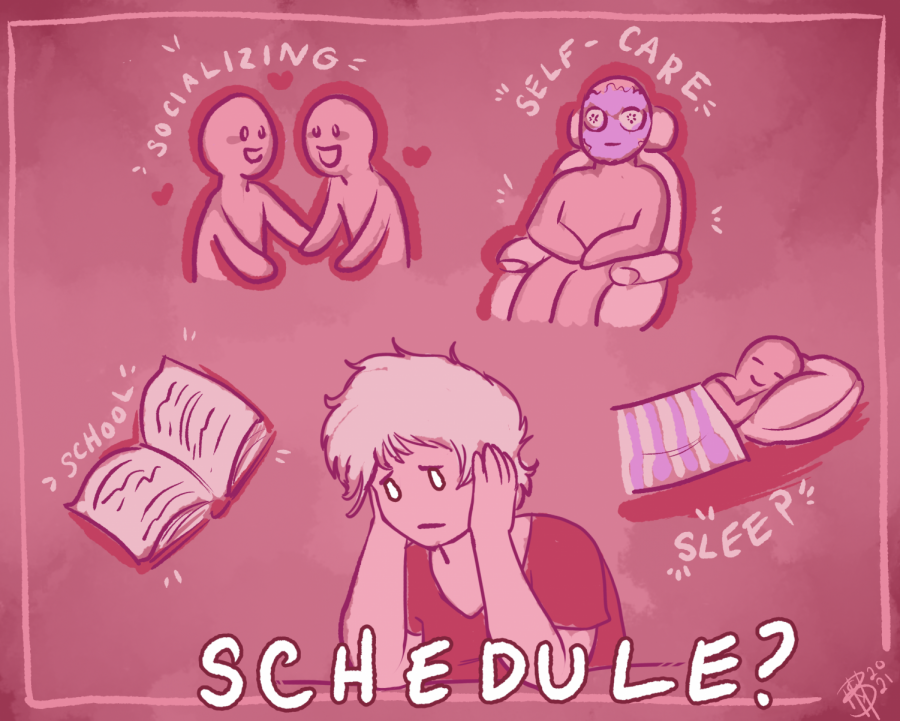- Beavers Digest / Cascades
- Beavers Digest / Cascades / Experience
- Beavers Digest / Experience
- Beavers Digest / Experience / Wellness
How to organize your schedule like a pro
While it can be difficult, having good time management skills can save a lot of time, and stress.
November 23, 2021
Just about everyone has had to juggle quickly-approaching deadlines while trying to also manage a tight schedule full of extracurricular activities, school projects, exams and personal matters. Is your schedule all screwed up and driving you nuts?
When there are a lot of activities competing for your attention, it can be difficult to stay organized.
According to Sarah Norek, the coordinator of outreach & education at Oregon State University’s Academic Success Center, organizing and scheduling can help us to plan more effectively and can increase the efficiency of our study and work sessions. It can also help us to see when we’re busy and when we have time available to engage in schoolwork, self-care, errands, etc.
“We often hear from and work with students who feel like they don’t have any time and we know folks are juggling a lot!” Norek said via email. “Sometimes we can find time, though, when we sit down and organize our schedule. We might see that we have gaps between classes or space during the day when nothing is planned. It may not be a huge portion of available time, but with a little planning ahead, a lot can happen in just five minutes!”
Spending some time organizing your schedule can also help you stay on top of your coursework, including meeting deadlines, giving yourself plenty of time to study for exams, etc., according to Norek.
“As a mom of two littles, organizing my schedule is important so that I can spend the right time on the right tasks—it helps me to focus my energy appropriately on priorities at work and at home,” said Jessi Hibsman in an email. Hibsman is a College of Business director of marketing at OSU.
Hibsman outlined how she organizes her schedule on a daily basis. She starts by thinking about all of her work tasks, then she starts prioritizing tasks into two categories: what is important and what is urgent. She then writes those tasks down in her planner so that she can cross them off when they are complete.
“If I have other tasks pop up throughout the day, I log them in Asana, a project management tool that my team uses for projects,” Hibsman said. “I try to make sure they are captured there so that they don’t continue to take up my mental space. Throughout the work day, I perform my work in ‘sprints.’ So, if I anticipate something will take me an hour to do, I will put 30 minutes on my phone timer and focus only on that task with no distractions. When I’m done with the task, I’ll take a quick break to something else until I’m ready to come back for the second 30-minute sprint.”
Sreya Putrevu, a strategist at the ASC, said she plans per term, per week and then by day.
“For my term planning, when I receive my syllabus, I look at the big things I have due in the term like exams or any heavy-weighted essays and put them down in my planner,” Putrevu said.
Every week on Sunday night, Putrevu plans her assignments due, readings that she needs to complete, and other tasks that she needs to attend to. Every night, she evaluates what she needs to get done tomorrow and what tasks from today need to get pushed over.
“I tend to plan my dues a day before they are actually due in order to give myself some time to bounce back if need be,” Putrevu said.
Norek said it is always hard when we plan ahead and then life happens, but also, it is not uncommon for us to plan ahead and for life to happen.
“It can be helpful to try to plan flex time into our schedule–-time when we don’t have anything scheduled, and we can use it if we need to work longer on something, or have to push something off to finish something else, and if we don’t need any extra time for work, we can use it for a break and self-care,” Norek said.
According to Hibsman, there is always a curveball. Whether that is a child or family member who comes down with a fever, or an unexpected work deadline pops up—these curveballs require a shift in the timeline for other projects. When life happens, there is always a ripple effect that can be hard to manage, she added.
“We hear from folks that they make a schedule but forget to look ahead, and that’s understandable,” Norek said. “It isn’t uncommon to focus on what’s coming up immediately, and to prioritize the work that needs to happen for the next day or so, but it’s super stressful to realize that there’s another thing due the day after that we hadn’t seen in our planners! We talk with students about a time management method, and this idea that you’re looking at your schedule from multiple levels/angles.”
Hibsman suggested that students think about two things: 1) how to prioritize and focus, and 2) what process or system you use to hold yourself accountable. You can write to-do lists all day long, but if you haven’t figured out how to prioritize, then you will just be buried in to-do lists with no real accomplishments, according to Hibsman.
“The Academic Success Center has wonderful resources like free planners, Term at a Glance and the Weekly Schedules that students can utilize in order to facilitate their planning efficiently,” Putrevu said.
In terms of resources to help you grab your schedule by the reins, Norek suggested: the big picture view (term at a glance), the weekly view and the daily task view.
“Each of these different views helps to inform the other. The term view lets you capture all your major due dates and events, but doesn’t allow for many specifics. The task view lets you get really granular and think about the goals you might have for your work session and what you need to do that day and where. The weekly view lets you see your regular commitments, when you’re traveling and to where on campus or in the community [you’re traveling], etc,” Norek said, adding that using these approaches together can really build out your understanding of the time you have and the work and deadlines that you need to meet.
Now that we are in the week of midterm exams, Norek encourages students to get a sense for their deadlines, their projects and to get a head start on their preparation and study. It helps to use a Term at a Glance to see when you might have a lot of deadlines/projects happening at once. Even though we only have a few weeks left in the term, using this tool now can really help students to see how final exams and deadlines may stack up, as well as when we’ll be observing university holidays or any other commitments a student might have outside of school.
“Knowing these pinch points can help you think about how you might break larger tasks up into smaller pieces and spread shorter work sessions out throughout the week,” Norek said. “There’s still time to do everything that’s coming up and spreading things out! Breaking these larger tasks up can help, not only with our memory process and retention, but also reduce stress and support wellbeing.”
When it comes to looming deadlines and prioritizing tasks, sometimes the word “no” can be your best friend.
“…when I have a big work deadline coming up—for instance, if we’ve been working on a project for months and we are in the final stretch—then I start saying ‘no’ or ‘this will have to wait’ to any little unimportant tasks that could be distracting from my larger goal,” Hibsman said. “I have to make a conscious effort to not let any distractions crowd my mental space.”
This tactic may be especially helpful during midterms and finals weeks. Putrevu said if she were working with a student to prepare for an exam, she would recommend backwards planning.
According to Putrevu, backwards planning involves breaking your study sessions up by day at least a week or two before your test so that you have time to thoroughly study, practice and ask questions. She suggests that students check out the backwards planning worksheet that the Academic Success Center offers to facilitate that process for them
Norek said if scheduling and planning is not already a part of your regimen, start doing it right now. According to Norek, our best-laid plans may not always come to fruition, but having a plan to work with and adapt to can help us concentrate our work sessions, know what resources we require and participate in our study and practice more successfully.
“So, being really specific: where are you going to study, for how long, what are your goals for the session, etc.,” Norek said. “These details can set you up for success when you sit down to begin. We have a few different tools that can help too: 7 Day Study Plan, Planning Out Your Study Session and the Finals Survival Guide can all help with organization and planning.”
The goal of organizing is to keep everything in order—bringing a sense of security and increased efficiency to your daily life. Organizing your schedule, especially in college, will help you stay motivated to achieve your goals academically, professionally and personally. When you start being organized, you will find life challenges are much easier to tackle.
Hibsman offered some parting advice: “find a process that works for you, and be willing to change that process along the way.”






